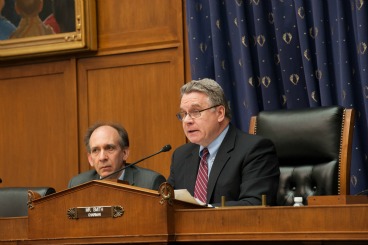H. Con. Res. 190 expresses the sense of the Congress that the Russian Federation should fully protect the right of its people to worship and practice their faith as they see fit. This freedom is the right of all religious communities without distinct, whether registered or unregistered, and that is stipulated by the Russian Constitution and by international standards.
Yet I am sorry to report religious freedom for minority religious communities throughout the Russian Federation have been under growing pressure as local officials and government authorities continue to harass and limit the abilities of these groups to practice their faith freely.
As we learned at a recent Helsinki Commission hearing, instances of violence have become alarmingly common. Arson attacks against churches in Russia have occurred in several towns and cities with little or no police response.
In its 2005 International Religious Freedom Report, the State Department Office on International Religious Freedom notes: “Some Federal agencies and many local authorities continue to restrict the rights of various religious minorities. Moreover, contradictions between Federal and local laws and varying interpretations of the law provide regional officials with opportunities to restrict the activities of religious minorities. Many observers attribute discriminatory practices at the local level to the greater susceptibility of local governments than the Federal Government to discriminatory attitudes in lobbying by local majority religious groups. The government only occasionally intervenes to prevent or reverse discrimination at the local level.”
Mr. Speaker, the internationally recognized expert on religious liberty in Russia, Larry Uzzell, has written: “Russia has now come to use as standard practice methods of religious repression that were applied only occasionally in the 1990s. Secular bureaucrats now typically refuse to authorize land transfers to Baptist churches and also forbid movie theaters or other public halls to sign rental contracts with them.” As a result, as an example: “In Moscow City alone some 10 Baptist congregations have ceased to exist simply because they could not find places within which to worship.”
I would just note parenthetically, Mr. Speaker, I want to thank Larry for his extraordinary work in bringing this matter to the attention of the Congress. Larry is a tireless advocate for oppressed believers throughout Russia and Central Asia. He is facing some serious health issues now, and I would like to wish him a very speedy recovery.
Mr. Speaker, in response to this growing and very negative trend in Russia, this resolution urges the Russian Federation to “ensure full protections of freedoms for all religious communities without distinction, whether registered or unregistered, and to end the harassment of unregistered religious groups by the security apparatus and other government agencies, as well as to ensure that law enforcement officials rigorously investigate acts of violence against unregistered religious communities, and to make certain that authorities are not complicit in such attacks.”
I point out that in March 2004 a district court banned the religious activity of Jehovah’s Witnesses in Moscow. For 2 years now the authorities have used the Moscow decision to harass the Jehovah’s Witnesses Administration Center in St. Petersburg, with threats to “liquidate” the administrative center which could threaten local congregations of Jehovah’s Witnesses throughout all of Russia.
Members of the Russia’s Muslim community and respected human rights activists have expressed concern regarding what they contend are large-scale fabrications of terrorism against Russian Muslims. One of Russia’s Supreme Muftis has stated that random police checks and arrests are becoming commonplace throughout Russia for Russian Muslims.
Let me reiterate that Russia has every right to defend itself against terrorism and to investigate and prosecute terrorists. Of course it does. Here in the United States we face the problem of combating terrorism while safeguarding civil liberties. I would urge the government, however, to strive for the proper balance in defending both its citizens as well as their civil liberties.
Mr. Speaker, the religious liberty picture in Russia is not entirely dark, and it would be disingenuous to make that assertion.
There are Nations that have worse records. They can be found on the list of “countries of particular concern” that is issued by the U.S. Department of State in its annual report on religious freedom around the world, so-called CPC countries like Vietnam.
However, Russia is a member of the U.N. Security Council, an OSCE-participating State, and will soon chair the Council of Europe. In addition, this year, it is the chair of the G-8 and the host of the G-8 Summit in St. Petersburg in July. Considering all of these positions, they should be expected to uphold basic, internationally recognized and accepted standards to protect peaceful religious practice.
That is what this resolution is all about.




